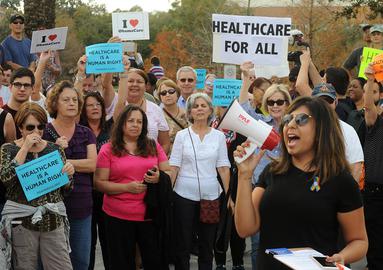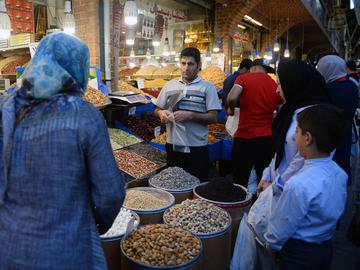There were many “firsts” in the United States mid-term elections on Tuesday, November 6 — and Iranian-Americans got multiple “firsts” on the same day. Three women in states across the country became the first Iranian-American women elected to state legislatures: Anna Kaplan in New York, Zahra Karinshak in Georgia and Anna Eskamani in Florida.
Sam Hamadani, also an Iranian-American woman, was elected as a judge in North Carolina.
Eskamani, one of many who declared their pride in being a successful member of the Iranian community in the US, grabbed most of the headlines and social media attention when it came to Iranians in the diaspora and in the US itself. The 28-year-old’s name quickly trended on Persian Twitter, with at least one person sending wishes that she might one day become president.
Another person posted photos showing “No Afghans” signs in Iran along with a caption that said Americans are proud of their diverse society but “Iranians should be ashamed of how we treat the Afghans.”
One notable tweet came from Sepanta Niknam, elected to be city councilor in the Iranian city of Yazd, who was booted out earlier this year by a section of the establishment because he follows the Zoroastrian religion. Sepanta was also 28 when he first got elected. In his tweet, he congratulated Anna Eskamani and spoke of the “pleasure of being chosen by people whose vote is rooted in humanity,” comparing his own status of belonging to a religious minority to Eskamani’s.
Born in Orlando in 1991, Eskamani has lived her entire life in central Florida but she has always kept up with the country from which her parents came.
“My Iranian identity has always been a part of me,” she told IranWire in a phone interview. “My parents came from two different parts of Iran and met in Florida. We were a working-class family and didn’t have a lot of money. My family worked all the time. My dad was a waiter and went to the University of Central Florida (UCF) to become an engineer. Even after he got a job on the space coast, he worked at Disney World at the weekends to help make ends meet.”
In her campaign videos, Anna explained how central her mother’s life was to her own story. Her mother passed away in 2004 after a battle with cancer. It made her determined to fight for affordable health care and to enter public life.
I asked her about growing up in Florida in the 1990s.
“There weren’t a lot of Iranian-Americans around. My twin sister and I were the only ones in our school,” she said.
She spoke of her experience of racism: “It was the worst right after 9/11. I was asked questions that assumed I had connections to terrorism. Some guy asked me one day if I was related to Bin Laden.”
“American culture had begun to demonize people of Middle Eastern descent,” Eskamani said. “Even though my experiences were never too hostile, my identity was targeted. But I never shied away from sharing my culture with others and speaking of who I was.”
A Life of Activism
Her first public life experience, however, predates 9/11. She was 10 years old when she organized a petition to prevent her best friend being moved to a different lunch period.
As she grew up, politics got more serious for her. She credits a civic teacher at her high school for inspiring her to take public life seriously. When she went to UCF, her academic work focused on policy research and political science after a period of environmental activism. She showed special interest in the women’s movement in Iran.
When the disputed 2009 election in Iran resulted in mass protests, the 18-year-old Anna Eskamani got active.
“When the elections were stolen in Iran, my sister and I wore wristbands in solidarity with the Green Movement,” she said.
In the summer of 2010, Anna and her sister were collecting petitions in support of human rights in Iran when they met the college’s Democrats. She was impressed with them and their take on local issues. Previously, she had not had a party affiliation but she now registered as a Democrat, just as her parents had.
When the nuclear talks with Iran were going on, Eskamani was already a locally-active Democrat.
“I supported President Obama’s approach [to] and reaching of the nuclear deal,” she said. “I am very disheartened with the lack of planning and the short-term approach of President Trump in foreign policy.”
As a state legislator, she knows that her work is more focused on local issues, which she says includes “passing a budget that will properly fund our school, health system and environmental protections.” But Eskamani hopes that by “being an effective legislator who is also a daughter of immigrants from Iran,” she can “help destigmatize Iranians in Florida and America as a whole.”
I told Anna about some of the Persian tweets praising her and it’s as if I could hear her blush on the other end of the line.
“This is insane,” she said. “I am so honored.”
Inspired by Iranian Women
“When my mom passed away, I was 13,” she said. “I started reading a lot of literature about Iranian women because I believe death ends a life, not a relationship. I read the work of Shirin Ebadi and other Iranian women and tried to put myself in her shoes.”
She also speaks of her “love and respect for the strength of Iranian women” and how in most recent protests women were “leading the way” — like Neda Agha Soltan, who became an icon of the 2009 movement after she was shot dead — “murdered” as Eskamani reminds me. She also points to the fact that women have “used their personal style, both before and after the revolution” to struggle for social change.
Anna Eskamani outlines her vision for Florida with a passion that only comes from someone engaged with everyday issues.
“I want to help build a state where money is spent on public education and health care,” she said. “Where we invest in infrastructure, where we take action on gun violence and counter lax rules on environmental protection and gun access.”
But she knows that her election will matter to many more people living outside Florida.
In addition to the three Iranian-American women elected on November 6, several Iranian-Americans currently hold state offices in the US. Cyrus Habib is currently a Lieutenant Governor in the state of Washington, which means he serves as the president of the state senate. He lost his eyesight to cancer at the age of eight and has thus achieved one of the highest ranks for a blind person in the US.
There is also Adrin Nazarian, an Iranian-Armenian Democrat who serves at the California State Assembly, representing sections of Los Angeles’ San Fernando Valley.
Now a number of women will join them and they do so while being very aware of their Iranian identity. In her victory speech, Kaplan said she was “honored” that people of Long Island chose her, “a Jewish refugee from Iran.”
Zahra Karinshak helped Democrats make inroads into northern suburbs of Atlanta. Like Eskamani, she was endorsed by the National Iranian American Council (NIAC), a non-profit organization known for its strong advocacy for the Iran Deal, or the Joint Comprehensive Plan of Action.
Relations with Iran have long been a topical issue in US politics, and this will continue to hold significance. So it’s perhaps fitting that at the same time, Iranian-Americans play an increasing role in the country’s politics.
visit the accountability section
In this section of Iran Wire, you can contact the officials and launch your campaign for various problems



























comments